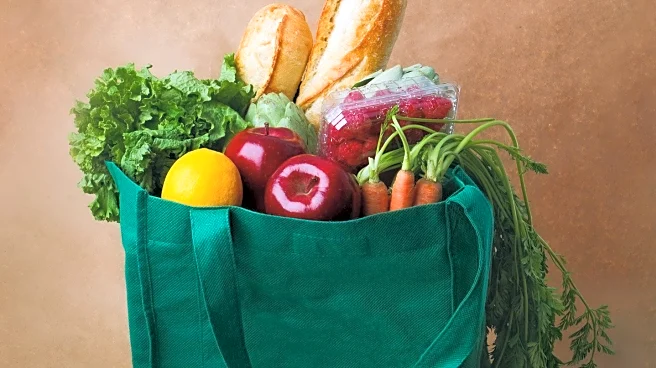What's Happening?
Amid rising food costs, meal planning experts are advocating for bulk buying as a strategy to reduce grocery expenses. According to insights from experts, purchasing items like canned beans, frozen proteins, butter, dry pasta, specialty items, and paper products in bulk can lead to significant savings. For instance, canned beans, which have a long shelf life, can be bought in bulk at warehouse stores like Costco, reducing the cost per serving to about 30 cents. Similarly, frozen proteins and butter can be stored for extended periods, making them ideal for bulk purchases. Experts also highlight the importance of considering storage space and the shelf life of products to avoid wastage.
Why It's Important?
Bulk buying is increasingly seen as a financially savvy approach to managing household budgets, especially in the face of rising grocery prices. By purchasing in bulk, consumers can potentially save up to $1,000 annually. This method not only helps in reducing the frequency of store visits but also ensures that households have a steady supply of essential items. The strategy is particularly beneficial for families looking to maximize their savings without compromising on quality. Additionally, bulk buying supports sustainable consumption by minimizing packaging waste and reducing the carbon footprint associated with frequent shopping trips.
What's Next?
As more consumers turn to bulk buying, retailers like Costco and Sam's Club may see increased demand for bulk-packaged goods. This trend could lead to expanded offerings and competitive pricing strategies to attract budget-conscious shoppers. Consumers are likely to continue exploring bulk buying as a viable option, especially as economic pressures persist. Meal planning experts may further educate the public on effective bulk buying strategies, including tips on storage and usage to prevent wastage.
Beyond the Headlines
The shift towards bulk buying reflects broader changes in consumer behavior, driven by economic challenges and a growing awareness of sustainable practices. This trend may influence how retailers stock and market their products, potentially leading to innovations in packaging and distribution. Additionally, the emphasis on bulk buying could encourage consumers to adopt more organized and strategic approaches to meal planning and household management.











